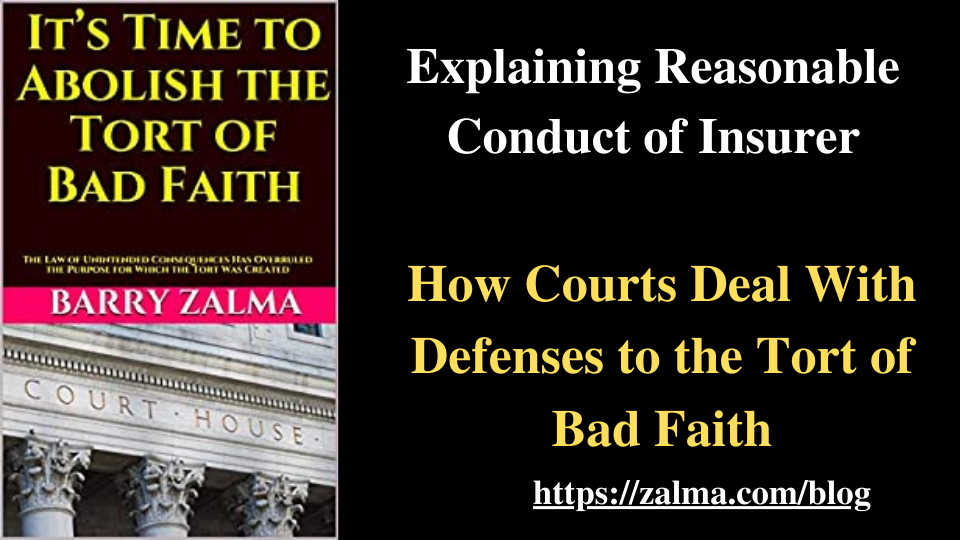Explaining Reasonable Conduct of Insurer

How Courts Deal With Defenses to the Tort of Bad Faith
Read the full article at https://lnkd.in/gwFdWEZj and see the full video at https://lnkd.in/g6ZvyJ6U and at https://lnkd.in/gHd4NzA7 and at https://zalma.com/blog plus more than 4250 posts.
I will not be posting for a week after this but you have available more than 4250 posts and more than 400 videos at rumble.com/zalma.
When the Court found that an insureds claim was debatable, the bad-faith claim must fail. Bad-faith claims were insufficient as a matter of law where the status of Kentucky law on the issue was “fairly debatable.” [Willowbrook Invs., LLC v. Md. Cas. Co., 325 F.Supp.3d 813 (W.D. Ky. 2018)The courts, legislatures and the insurance departments of the various states must recognize that an insurer with the best of all possible fraud investigation units will, on occasion, err. A company with a highly trained and motivated fraud investigation unit made up of professional investigators and attorneys who are human, will err on occasion.
The public, and those who serve on juries, must understand that an aggressive fraud investigation, even if it reaches an incorrect result, is not malicious and if negligent, not an act of bad faith.
Before I retired from the practice of law, I contended daily with insurers who wanted to fight fraud but who found they must decide to pay a claim rather than face the exposure of a punitive damage judgment. Sometimes, the settlement of bad faith lawsuits, where there has been no bad faith and an appropriate denial of a claim or refusal to pay a policy limits demand, the insurer concludes it must pay more to avoid a potential run-away jury.
I can, as my mentors taught me 53 years ago, state with confidence the opinion that an insurer should spend millions of dollars for the defense of a non-covered or fraudulent claim and not a dime for tribute to an insured who brings a spurious bad faith law suit.
The abuse of the tort of bad faith has become so extreme that the tort must, in my opinion, be eliminated. Since the weight of authority is that no matter how reasonable are the arguments to do away with the tort of bad faith, the tort must be applied fairly and equally to both insureds and insurers and if that is impossible the tort of bad faith is contrary to the requirements of the Fourteenth Amendment to the U.S. Constitution and its requirement for equal protection.
An insurer who is wronged by its insured should have the same right to tort damages and punitive damages for breach of the covenant as can the insured. No litigant should ever be more equal than another.
(c) 2022 Barry Zalma & ClaimSchool, Inc.
Barry Zalma, Esq., CFE, is available at http://www.zalma.com and [email protected].
Subscribe to Zalma on Insurance at locals.com https://lnkd.in/gn5WAi6C.
Subscribe to Excellence in Claims Handling at https://lnkd.in/gNm9EWKJ.
Go to Barry Zalma videos at Rumble.com at https://rumble.com/c/c-262921.
We are 100% funded for October.
Thanks to everyone who helped out. 🥰
Xephula monthly operating expenses for 2024 - Server: $143/month - Backup Software: $6/month - Object Storage: $6/month - SMTP Service: $10/month - Stripe Processing Fees: ~$10/month - Total: $175/month
- Art
- Causes
- Crafts
- Crime
- Dance
- Drinks
- Film
- Finance
- Fitness
- Food
- Juegos
- Gardening
- Health
- Home
- Literature
- Music
- Networking
- Paranormal
- Other
- Politics
- Directorio
- News
- Party
- Science
- Religion
- Shopping
- Sports
- SyFy
- Politically Incorrect
- Philosophy
- Theater
- Technology
- Wellness



